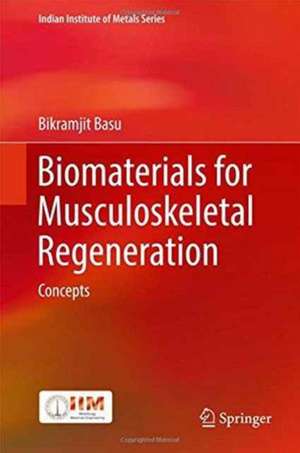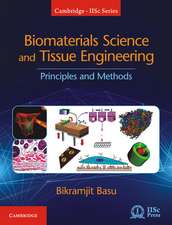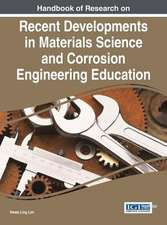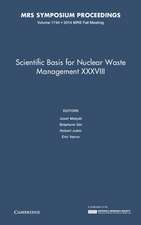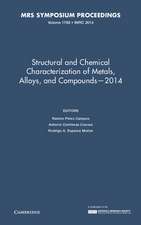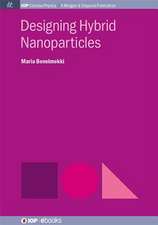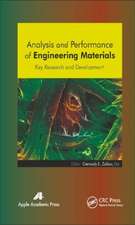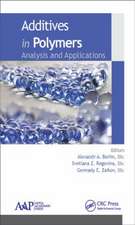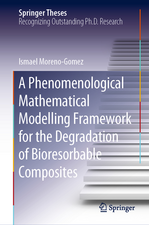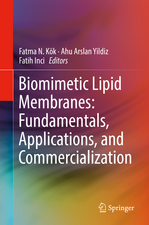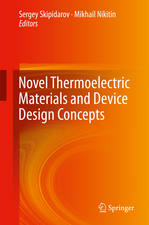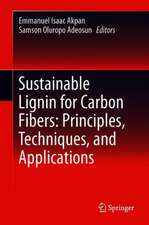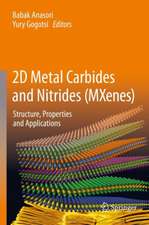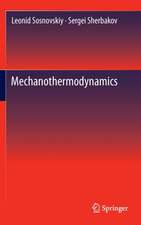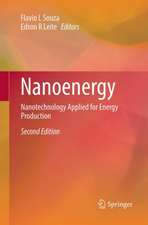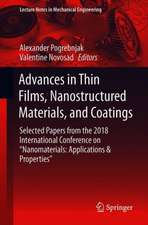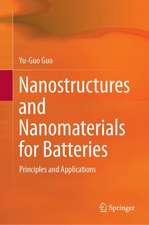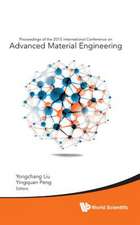Biomaterials for Musculoskeletal Regeneration: Concepts: Indian Institute of Metals Series
Autor Bikramjit Basuen Limba Engleză Hardback – 11 noi 2016
| Toate formatele și edițiile | Preț | Express |
|---|---|---|
| Paperback (1) | 794.86 lei 38-44 zile | |
| Springer Nature Singapore – 29 iun 2018 | 794.86 lei 38-44 zile | |
| Hardback (1) | 819.01 lei 38-44 zile | |
| Springer Nature Singapore – 11 noi 2016 | 819.01 lei 38-44 zile |
Din seria Indian Institute of Metals Series
- 18%
 Preț: 1410.63 lei
Preț: 1410.63 lei - 15%
 Preț: 650.69 lei
Preț: 650.69 lei - 18%
 Preț: 1839.17 lei
Preț: 1839.17 lei -
 Preț: 386.22 lei
Preț: 386.22 lei - 20%
 Preț: 551.07 lei
Preț: 551.07 lei - 18%
 Preț: 749.27 lei
Preț: 749.27 lei - 18%
 Preț: 1251.98 lei
Preț: 1251.98 lei - 18%
 Preț: 1245.97 lei
Preț: 1245.97 lei - 24%
 Preț: 1085.75 lei
Preț: 1085.75 lei - 15%
 Preț: 656.43 lei
Preț: 656.43 lei - 20%
 Preț: 557.21 lei
Preț: 557.21 lei - 18%
 Preț: 975.22 lei
Preț: 975.22 lei - 18%
 Preț: 1023.74 lei
Preț: 1023.74 lei - 18%
 Preț: 1116.57 lei
Preț: 1116.57 lei - 18%
 Preț: 1116.57 lei
Preț: 1116.57 lei
Preț: 819.01 lei
Preț vechi: 1077.65 lei
-24% Nou
Puncte Express: 1229
Preț estimativ în valută:
156.74€ • 170.19$ • 131.66£
156.74€ • 170.19$ • 131.66£
Carte tipărită la comandă
Livrare economică 19-25 aprilie
Preluare comenzi: 021 569.72.76
Specificații
ISBN-13: 9789811030581
ISBN-10: 9811030588
Pagini: 448
Ilustrații: XXXIII, 420 p. 172 illus., 109 illus. in color.
Dimensiuni: 155 x 235 x 30 mm
Greutate: 1 kg
Ediția:1st ed. 2017
Editura: Springer Nature Singapore
Colecția Springer
Seria Indian Institute of Metals Series
Locul publicării:Singapore, Singapore
ISBN-10: 9811030588
Pagini: 448
Ilustrații: XXXIII, 420 p. 172 illus., 109 illus. in color.
Dimensiuni: 155 x 235 x 30 mm
Greutate: 1 kg
Ediția:1st ed. 2017
Editura: Springer Nature Singapore
Colecția Springer
Seria Indian Institute of Metals Series
Locul publicării:Singapore, Singapore
Cuprins
Chapter 1: Introduction.- Chapter 2: Important Definitions and Concepts.- Chapter 3: Natural Bone and Tooth: Structure and Properties.- Chapter 4: Processing of Implantable Biomaterials.- Chapter 5: Fundamentals of Scaffolds Fabrication Using Low Temperature Additive Manufacturing.- Chapter 6: Mechanical Properties of Biomaterials.- Chapter 7: Friction and Wear Behavior.- Chapter 8: Corrosion and Degradation of Implantable Biomaterials.- Chapter 9: Probing Toxicity of Biomaterials and Biocompatibility Assessment.- Chapter 10: Three Dimensional Porous Scaffolds: Mechanical and Biocompatibility Properties .- Chapter 11: Introduction to Biomechanics and Orthopedic Device Testing.- Chapter 12: A Way Forward.
Recenzii
“‘Biomaterials for Musculoskeletal Regeneration: Concepts’ provides in detail some fundamental information about materials, biomaterials, and to a lesser degree cells and cell–material interactions and seeks to introduce the basic concepts of biomaterial science pertaining to musculoskeletal regeneration from a material science perspective. It is best suited to undergraduate and graduate students and other scientists just entering the field. … a worthy addition to the library of any Materials Scientist curious about the world of biomaterials for hard tissue repair.” (Yusuf M. Khan and Lakshmi S. Nair, Journal of Materials Science, August, 2016)
Notă biografică
Dr. Bikramjit Basu is currently Professor at the Materials Research Center and holds Associate Faculty position at Center for Biosystems Science and Engineering, Indian Institute of Science (IISc), Bangalore. He is currently an Adjunct faculty at Indian Institute of Technology Kanpur (IITK). After his undergraduate and graduate degree in Metallurgical Engineering, he earned his PhD in Ceramics at Katholieke Universiteit Leuven, Belgium in March, 2001. After a brief post-doctoral stint at University of California, Santa Barbara, he joined IITK in November 2001 as Assistant Professor and was promoted to Professor at IITK in March, 2012.
Over close to last two decades, Bikramjit Basu has made outstanding contributions to the field of Biomaterials, wherein he has brought in a strong materials engineering perspective to address biologically and clinically relevant problems. An ardent believer of ‘Bedside to bench to bedside’ concept, he is currently leading, as principal investigator, the largest center of excellence on Biomaterials in India with an interdisciplinary team of 15 co-investigators and 20 young researchers (of seven institutions) from diverse background of materials science, histopathology, polymer science, biomechanics, ceramics engineering, prosthodontics, orthopedics and biomedical entrepreneur to translate biomaterial innovations to orthopedic and dental applications. As Principal Investigator of multi-institutional research programs on biomaterials funded by Indo-US Science and Technology forum (2008-2012) and UK-India Education & Research Initiative, UKIERI (2009-2012), he has played a pivotal role towards the success of multiple bilateral projects in the area of orthopedics and cardiovascular tissue engineering. His collaborative research with Brown University on developing PLGA-carbon nanofiber based cardiac patches has received media attention worldwide. One of the landmark outcomes of his UKEIRI project has been to establish long term implant stability and osseointegration of a new generation of strontium-substituted glass ceramic implants for osteoporosis treatment. Prof. Basu’s international standing and impact on the field are illustrated by his prolific publication record (more than 225 peer-reviewed journal articles, including 25 papers in journals with high impact factor (>5.0), more than 20 invited review papers/book chapters) and citation record (total citation: ~ 5,300, H-index: 41). He currently serves on editorial board of 12 SCI journals. A critical citation analysis by Elsevier-Scopus has placed him as the topmost Biomaterial scientist of India, based on publications during 2010-2015. In order to promote Biomaterials research, he has been instrumental in initiating a new international conference series, BIND (Design of Biomaterials) and organised it at IITK (2006) and IISc (2012). In addition, he organized 20 thematic sessions at major conferences organised by American Ceramic Society and Society for Biomaterials. He has delivered 20 Plenary/Keynote lectures and 140 invited seminars in USA, UK, France, Germany, and Japan. Dr. Basu has served as a research adviser to 16 PhD students and mentored 10 young academic colleagues.
Prof. Basu’s contributions in Engineering Science have been widely recognised. He is one of the youngest recipients from the Metallurgy/Materials Science community as well as the only Biomaterial Scientist so far to receive India’s most coveted science award, Shanti Swarup Bhatnagar award (2013). He is an elected Fellow of the Indian National Academy of Engineering (2015), West Bengal Academy of Science and Technology (2014), Society for Biomaterials and Artificial Organs (2014) and National Academy of Sciences, India (2013). In 2015, he received National Bioscience award from the Government of India for unique contributions in the frontier areas of biological sciences. He remains the only Indian from India to receive the prestigious ‘Coble Award for Young Scholars’ (2008) from the American Ceramic Society.
Over close to last two decades, Bikramjit Basu has made outstanding contributions to the field of Biomaterials, wherein he has brought in a strong materials engineering perspective to address biologically and clinically relevant problems. An ardent believer of ‘Bedside to bench to bedside’ concept, he is currently leading, as principal investigator, the largest center of excellence on Biomaterials in India with an interdisciplinary team of 15 co-investigators and 20 young researchers (of seven institutions) from diverse background of materials science, histopathology, polymer science, biomechanics, ceramics engineering, prosthodontics, orthopedics and biomedical entrepreneur to translate biomaterial innovations to orthopedic and dental applications. As Principal Investigator of multi-institutional research programs on biomaterials funded by Indo-US Science and Technology forum (2008-2012) and UK-India Education & Research Initiative, UKIERI (2009-2012), he has played a pivotal role towards the success of multiple bilateral projects in the area of orthopedics and cardiovascular tissue engineering. His collaborative research with Brown University on developing PLGA-carbon nanofiber based cardiac patches has received media attention worldwide. One of the landmark outcomes of his UKEIRI project has been to establish long term implant stability and osseointegration of a new generation of strontium-substituted glass ceramic implants for osteoporosis treatment. Prof. Basu’s international standing and impact on the field are illustrated by his prolific publication record (more than 225 peer-reviewed journal articles, including 25 papers in journals with high impact factor (>5.0), more than 20 invited review papers/book chapters) and citation record (total citation: ~ 5,300, H-index: 41). He currently serves on editorial board of 12 SCI journals. A critical citation analysis by Elsevier-Scopus has placed him as the topmost Biomaterial scientist of India, based on publications during 2010-2015. In order to promote Biomaterials research, he has been instrumental in initiating a new international conference series, BIND (Design of Biomaterials) and organised it at IITK (2006) and IISc (2012). In addition, he organized 20 thematic sessions at major conferences organised by American Ceramic Society and Society for Biomaterials. He has delivered 20 Plenary/Keynote lectures and 140 invited seminars in USA, UK, France, Germany, and Japan. Dr. Basu has served as a research adviser to 16 PhD students and mentored 10 young academic colleagues.
Prof. Basu’s contributions in Engineering Science have been widely recognised. He is one of the youngest recipients from the Metallurgy/Materials Science community as well as the only Biomaterial Scientist so far to receive India’s most coveted science award, Shanti Swarup Bhatnagar award (2013). He is an elected Fellow of the Indian National Academy of Engineering (2015), West Bengal Academy of Science and Technology (2014), Society for Biomaterials and Artificial Organs (2014) and National Academy of Sciences, India (2013). In 2015, he received National Bioscience award from the Government of India for unique contributions in the frontier areas of biological sciences. He remains the only Indian from India to receive the prestigious ‘Coble Award for Young Scholars’ (2008) from the American Ceramic Society.
Textul de pe ultima copertă
This book covers the basics of the biomaterials science its applications to bone tissue engineering. The introductory section describes the most necessary concepts and techniques related to the cell and molecular biology with a particular focus on evaluating the biocompatibility property. The layout of this book facilitates easier understanding of the area of bone tissue engineering. The book integrates the Materials Science and Biological Science. It covers processing and basic material properties of various biocompatible metals and ceramics-based materials, in vitro and in vivo biocompatibility and toxicity assessment in the context of bone tissue engineering, and processing and properties of metal-, ceramic- and polymer-based biocomposites, including the fabrication of porous scaffold materials. The book can be used as a textbook for senior undergraduate and graduate coursework. It will also be a useful reference for researchers and professionalsworking in the area.
Caracteristici
Integrates the concepts of Materials Science and Biological Science Covers the necessary fundamentals of cell / molecular biology Covers processing and the basic material properties of various biocompatible metals and ceramics-based materials Includes supplementary material: sn.pub/extras
